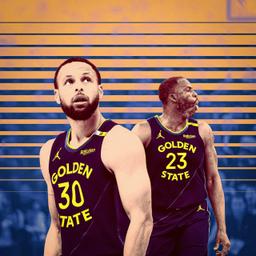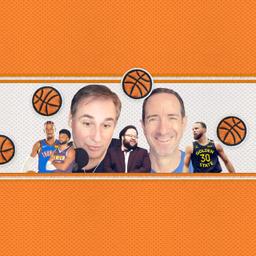
“What to some is pain, to me is really just fatigue,” the late, great Bill Walton once wrote. “I love and live for that fatigue and the soreness that comes with it.” Stay in that feeling for long enough, and there comes a breakthrough, a second wind. For all the wonders that lie in Nikola Jokic’s divine basketball intelligence, these days, I find myself most compelled by his almost supernatural endurance. Most of the greats make the game look easy yet nonetheless find ways to tap into struggle. Jokic literally wears that drama on his sleeve.
As soon as the whistle blows and the ball is tossed into the air, Jokic is already on the brink of collapse. His triceps have permanent temporary engravings, like the strongest walrus on a sheet of ice, the last alpha standing against a gauntlet of tusks. The scrapes and scratches deepen over the course of a game, then they heal, wiping the canvas clean for another round in a few days. His entire body expands and contracts with the heaving breaths he takes, with a mouth that’s always just a bit agape, as he stares off into a mile-long distance at mile-high altitudes. He conjures moments that make you feel alive; he’ll do it with a punch-drunk wobble that, if you didn’t know any better, might suggest he’s about to pass out. But he never does. That state of fatigue and soreness that Walton coveted? Jokic has internalized it. He’s harnessed its potential: the never-ending second wind.
Jokic has turned this property into something to be shared among his teammates. Earlier this year, I suggested that Jokic “instills a greater consciousness on the floor akin to nature itself.” Regardless of the situation or the scoreboard, he trundles on. The game isn’t over until the best player on earth concedes, and until he does, the rest of the Nuggets have an almost biological obligation to keep going. Jokic never gave up in Game 1; ergo, neither did they. The opening stanza of the Western Conference semifinal matchup between the Denver Nuggets and the top-ranked Oklahoma City Thunder looked to favor the home team for just about the entire night. OKC’s lead would swell to double digits but recede to eight, to five. Ebbs and flows. Again and again. Never quite in hand, never quite out of reach. Coming into the series, we knew that one of the key pressure points would be the Thunder’s lack of crunch-time reps—after all, OKC won almost 80 percent of its regular-season games by at least 10 points. The Nuggets, meanwhile, came off one of only two Game 7s in the postseason thus far and played more than twice as many clutch minutes as the Thunder in the regular season.
And once again, in unbelievable fashion, the Nuggets found a way to win in the final ticks of regulation.
“We’ve been through a lot with this group,” two-time hero Aaron Gordon said after Game 1. “We’ve come from behind in plenty of games. It’s not necessarily what we’re trying to do, or what we want to do. But we know we’ve been in that position.”
There is a subtext in Gordon’s words: Oklahoma City hasn’t been in this uncomfortable position enough. He isn’t wrong. I’m usually not the type to relitigate the previous night’s follies, but there were two pivotal, regrettable moments in the closing minutes of Game 1 that overrode what could have been an important close-game win for a Thunder team that is, confoundingly, both dominant and inexperienced. With 3:48 remaining in the game, Shai Gilgeous-Alexander was called for a loose-ball foul after he made contact with Jokic. There was some hand-fighting from both MVP hopefuls during the possession; Thunder coach Mark Daigneault made the executive decision to challenge the ruling—despite SGA rushing over to implore him not to. It was a curious (and unsuccessful) decision. For one, a lot of junked-up challenges are made as appeals to ego, a symbolic show of support to a star player’s emotional response to a perceived injustice. This was the exact opposite. Daigneault must have gleaned a sliver of possibility in the moment: Jokic had five fouls, and whether he initiated the contact or not, he did swipe away at Gilgeous-Alexander’s arm. The Thunder were up nine at the time; even the slightest possibility of forcing Jokic out of the game was too much to pass up.
But if that was Daigneault’s intent, it makes the second regrettable moment even harder to parse. With 12.9 seconds remaining in a one-point game, the Nuggets made a defensive substitution to get Jokic off the floor to prevent the risk of fouling out; Daigneault drew up a perfect sideline out-of-bounds play to part the seas for a wide-open SGA dunk. Without any timeouts, the Nuggets had no ability to bring Jokic back on the court. This was the Thunder’s dream scenario. This was exactly what Daigneault had presumably sacrificed a timeout on the earlier challenge to achieve. Yet the Thunder, holding steadfast to their team principles, fouled up three, taking just 0.4 seconds off the clock and allowing Jokic to reenter the game. The rest is history. At the last second, OKC invited chaos to dinner; it walked into the room and flipped the table.
“It’s tough to switch the strategy,” Daigneault told reporters after the game. “We’ve got the guys locked in on fouling up three as a philosophy. They executed it. Anything with the fouling-up-three stuff in terms of timing, that’s on me. I’ll take full responsibility for that.”
In the battle between the nature of Jokic and the nurture of Daigneault, nature landed the first blow. Game 1 was a classic and a punch in the mouth that the Thunder probably needed to experience sooner rather than later. “It should be fun,” Gilgeous-Alexander said after the game. “We’re going to find out what we’re made of, what we’re really made of.”
It should be fun, indeed. In the coming days, the NBA will announce the 2025 MVP winner, with this fated matchup serving as both backdrop and immediate referendum. This is the first time the top two in MVP vote getters have faced each other in a playoff series since 2016-17, when Russell Westbrook faced James Harden in the first round. It has occurred 24 times since the MVP award was instituted during the 1955-56 season. It’s happened only four times, including this series, since the ’90s. That speaks, in part, to how much expansion has increased the entropy of the league, if not parity. But there is something transformative about these matchups for both careers and public memory. Larry Bird, Kareem Abdul-Jabbar, and Bill Russell all had four seasons in which they faced their stiffest MVP competition in the playoffs. So did Michael Jordan—a not-insignificant part of the MJ mythology was born of Jordan facing each of his MVP opponents (Magic Johnson, Clyde Drexler, Karl Malone twice) in the Finals and emerging victorious every time.
It’s only right that one of the most hotly contested MVP races in recent memory would find resolution in this particular arena, where styles and team ethos are magnified. The Nuggets feed off the invisible channels of communication and recognition that Jokic has installed and instilled—they champion the hivemind mentality. The Thunder—exemplified through SGA’s off-beat, on-command attack—are relentless in picking their spots, constantly finding new angles of attack; they embrace the swarm. Nobody ever said it would be easy for the Thunder, and the Nuggets sure as hell don’t make things easy for themselves. These matchups are becoming exceedingly rare and should be cherished as such. They have the power to write new legends and construct the league’s rightful order. It’s funny—winning MVP kind of feels immaterial right now. That’s part of the magic of a best-of-seven series, isn’t it? We’re all locked in a moment, together. The MVP award is a reflection of the past. Jokic and Gilgeous-Alexander, the Nuggets and the Thunder—they all have a future left to play for. Nothing is more precious than that.




